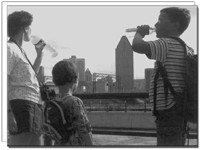题目内容
III. 完形填空(Cloze)(共15小题,计15分)
阅读下面短文,掌握其大意,然后从方框内选择适当的单词或短语填空。方框内有多余的词或短语,每个词或短语限用一次。(答案写在答题纸上)
| found, may, of, led to, sometimes, rather than, mad, in fact, even if, different, water, part, drink, as well as, natural, include, important, wherever |
 | Many tourists nowadays walk around carrying plastic bottles of water, even in cities. The bottles seem to have become an (71)________ fashion accessory(配件), and not only for tourists. (72)________, nowadays everyone seems to carry a bottle of water with them (73)________ they go. This fashion for being seen with bottled water, (74)________ called “designer water”, has (75)________ a massive(大量的) increase in sales over the past few years. There are now so many (76)________ brand names available in the shops that it is hard to choose. |
It is advertised as clean and (82)________, while tap water (83)________ be viewed with suspicion (怀疑).
But is there really any difference between bottled and tap (84)________? Surprisingly, in the USA it was (85)________ that bottled water was not always as pure as most ordinary tap water.
71. important 72. In fact 73. wherever 74. sometimes 75. led to 76. different 77. rather than 78. part 79. drink 80. as well as 81. of 82. natural 83. may 84. water 85. found
略

练习册系列答案
 孟建平错题本系列答案
孟建平错题本系列答案 超能学典应用题题卡系列答案
超能学典应用题题卡系列答案
相关题目